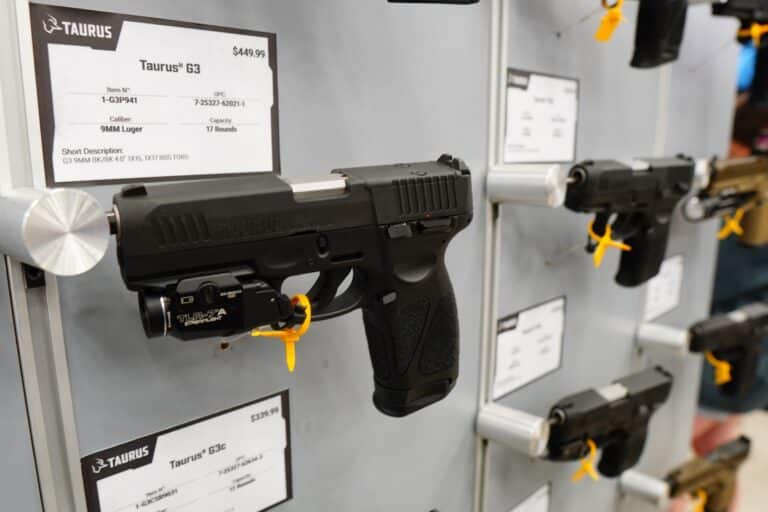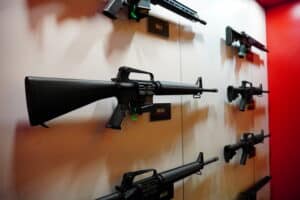Thus far, Massachusetts has lagged behind most of its formerly may-issue counterparts in passing a replacement gun-carry law following last June’s Bruen decision. Now, Bay State lawmakers appear prepared to compensate for that delay by enacting a response bill far broader than any of its predecessors.
Massachusetts Representative Michael Day (D.) introduced HD 4420 late last month. The 140-page bill seeks to completely overhaul that state’s gun laws to address, in his words, “a rogue Supreme Court” and “increasingly sophisticated criminal activity” in the state.
“While the Commonwealth’s gun laws are among the best in the nation, unrelenting acts of violence and the Supreme Court’s deleterious Bruen decision demand legislative action both here in Massachusetts and on the Federal level,” Massachusetts House Speaker Ron Mariano (D.) added, according to the Boston Herald.
The gun-rights world has reacted to the bill with horror. The NRA declared the bill “unprecedented” in its scope, while the Gun Owners Action League, a Massachusetts gun rights group, has taken to calling the bill the “Lawful Citizens Imprisonment Act.”
With such strong conviction attached to either side of the bill, it’s important to understand what the current text of the bill does and does not do.
Carry Restrictions
Like the other Bruen response bills, HD 4420 seeks to overhaul Massachusetts’ regulations on applying for, obtaining, and using a concealed carry permit.
On the front end of the application process, the bill in its current form does not alter application fees or the duration of a carry permit’s validity—which remain $100 and six years, respectively. However, it does add live fire and a written exam to the required curriculum for any training course to meet state standards. It spells out a process for the Massachusetts State Police to determine the exact specifications of the training course at a later date.
Once a permit is issued, the bill creates many new sensitive places where licensed carry is prohibited, similar to those enacted in New York, New Jersey, Maryland, and Hawaii. It would make it a crime punishable by up to $1000 in fines and two and a half years in prison to possess a firearm, loaded or unloaded, in or upon the grounds or parking areas of any government building, polling place, educational institution, and any private property unless the owner affirmatively provides consent for licensed carry on the premises.
New “Assault-Style Firearm” Restrictions
The bill expands the state’s already extensive restrictions on so-called assault-style weapons by broadening the state’s definition of banned guns to include any semi-automatic rifle, pistol, or shotgun that can accept a detachable magazine and has one or more listed cosmetic features, any “semiautomatic version of any fully automatic firearm,” any “automatic part,” and an extensive list of hundreds of firearms listed by make and model. The state’s previous ban merely listed banned “assault weapons” by make and model, in addition to prohibiting any “copies or duplicates” of said guns as determined by the discretion of the Attorney General.
The bill outlaws the possession, transfer, and sale of affected weapons and does not grandfather any owned or legally purchased after September 13, 1994. “Large capacity” magazines, defined as those capable of holding more than ten rounds, are also totally banned unless they were continuously owned before September 13, 1994. In this case, the owner can continue to possess them but may not use them unless on private property or at a licensed gun range. They can also transfer authorized large-capacity magazines to an heir, a licensed dealer, or someone in another state as long as they report the transaction.
Violators of the newly-construed ban on assault-style weapons and large-capacity feeding devices could face up to $10,000 in fines and ten years in prison for a first offense, and up to $15,000 in fines and 15 years in prison for subsequent offenses.
Targeting “Ghost Guns”
In an attempt to crack down on homebuilt guns, the bill would prohibit the possession or sale of any unserialized firearm, defined liberally to include parts like frames, receivers, and even barrels, as well as non-lethal options like stun guns. It also bans possession of unserialized magazines even though magazines are not sold with serial numbers.
It mandates that any gun owner wishing to make a firearm or magazine obtain a unique serial number for each before final assembly. Then, within seven days of completing the firearm or ammunition feeding device, the gun owner would be required to register it with the state department of public safety.
New Registration Requirements
The bill would require the registration of any firearm or “feeding device” with the state Department of Criminal Justice Information Services, which would be tasked with documenting the name, address, and contact information of the registrant; license or permit type, number, and expiration date for registrant; manufacturer, make, model, caliber, and serial number of each firearm or feeding device; date each was acquired; name and address of source from which each was obtained, including the name and address of the prior owner if there was one; and a statement signed by the registrant under the penalty of perjury that they are properly licensed and not otherwise prohibited from owning a firearm.
It also requires notification of any “additive manufacturing.”
“Smart Gun” Mandates
The text of section 61 of the bill appears to mandate smart guns as the only viable option for sale once they become available. It says any gun that doesn’t have “mechanical locks or devices designed to recognize and authorize, or otherwise allow the firearm to be discharged only by its owner or authorized user, by solenoid use-limitation devices, key activated or combination trigger or handle locks, radio frequency tags, automated fingerprint identification systems or voice recognition, provided, that such device is commercially available, shall be defective…”
It further stipulates that any entity that sells a non-smart gun once the state decides they are “commercially available” is liable for any death or personal injury caused by the firearm. Although, it also exempts law enforcement and the military.
Storage Requirements
The bill requires that all firearms—including gun parts, stun guns, and chemical sprays like mace—be “secured in a locked container” when not in use.
It defines safe storage as a container that “must be capable of being unlocked only by means of a key, combination or similar means and it must be able to deter all but the most persistent from gaining access.” A locked storage room would not qualify, and gun dealers would be required to follow the requirements as well.
It also requires that all firearms be unloaded and in a locked container during transportation.
Changes to Permit-to-Purchase procedures
The bill modifies the state’s existing Firearms Identification Card (FID)—which currently is required to purchase, possess, and transport “non-large-capacity” rifles, shotguns, and ammunition—into a “long gun permit” designed for the purchase and possession of “common long guns,” defined as non-large-capacity rifles and shotguns that are not semi-automatic. Any resident 18 years and older, or any resident aged 15-17 with the permission of a parent, may apply for the long gun permit.
The change makes it so that only residents in possession of a license to carry, which are limited to those 21 and older, may purchase semi-automatic long guns in addition to handguns. As such, the permitting change is a de facto ban on semi-automatic gun ownership for those younger than 21.
The bill’s new restrictions and mandates extend further and include dozens of new bureaucratic requirements for government agencies tracking firearms data, new requirements for gun retailers, and new obligations for recognized firearms trainers.
In sum, while the bill incorporates many of the same carry restrictions passed in other states looking to rebel against the Supreme Court, its scope goes far beyond the other Bruen response bills conjured thus far. If it passes, expect to see this bill tied up in court for the foreseeable future, where many of its provisions will likely fare poorly under the Bruen test its proponents are looking to buck.







One Response
Funny isn’t it that the state that was the cradle of the American Revolution and started that war over British designs to confiscate its citizens firearms, is the very same one that now seeks to enslave its citizens, forcing them to bow to their masters in Boston. If liberals want to go down the road of not complying with the rulings of the Supreme Court then they are in the company of the Arkansas governor after the Brown vs Board of Education decision. Assuming SCOTUS strikes down this law, resistance against the ruling should result in the arrest of any MA public official and trial in Federal Court for violating the constitutional rights of MA citizens. And that goes for the governments of NY, NJ, CA, RI, WA, IL, OR and MD.